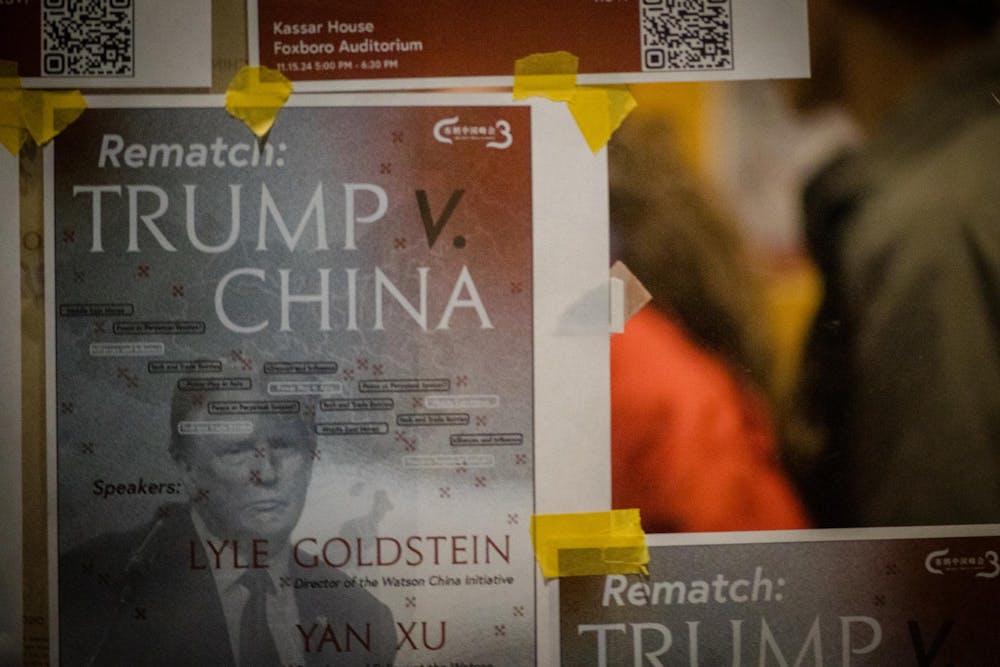Lyle Goldstein, director of the China Initiative, lobbied against U.S. intervention to defend Taiwan in a Brown China Summit panel on Friday.
The panel hosted by BCS, a student organization focused on China-related issues, explored what Trump’s return to the White House could signify for the next phase of U.S.-China relations at a panel titled “Rematch: Trump v. China.”
Goldstein told attendees that “China’s military is ready to go” when it comes to conquering Taiwan and that “the choices are limited” for an American defense of the nation.
In addition to Goldstein, the panel also featured Yan Xu, a postdoctoral fellow at the Watson Institute for International and Public Affairs who focuses on Chinese technological innovation. The China Initiative, housed within the Institute, explores modern Chinese affairs through an interdisciplinary lens.
The panel began with a discussion of President-elect Donald Trump’s victory. For Goldstein, Trump’s win made him feel “gloomy about the outlook for U.S.-China relations.”
“It’s hard to believe Trump has a grand strategy about anything,” Goldstein said when asked how China would factor into the president-elect’s second term.
Xu raised alarm about entrepreneur Elon Musk’s close ties with Trump, saying that Musk’s businesses “may benefit from” Trump’s U.S.-China policies.
Goldstein then discussed the pitfalls of the United States’ recent history of interventionist foreign policy, claiming that “China is already capitalizing on a lot of American missteps.” He referenced the United States’ inability to contain the current crisis in the Middle East and past failures in Afghanistan and Iraq as examples of a changing global landscape with American dominance on the decline.
As for Trump, Xu said the president-elect’s intentions will be far clearer once he names his secretaries of commerce and treasury given their broad jurisdiction over trade issues.
Xu mentioned the “decisive” role that inflation played in the 2024 presidential election and suggested that it could influence some of Trump’s policies — even as he plans to increase tariffs on Chinese goods.
Taiwan’s semiconductor production — vital for the manufacture of phones, laptops and cars — is seen as a motivator for China as the country eyes an invasion of Taiwan, Goldstien said. But he disagreed with this point, saying that he “does not see any evidence for China attacking Taiwan to gain access to” Taiwan Semiconductor Manufacturing Company, a preeminent manufacturer in the sector.
Even as the former president touts his record of “no new wars” started under his presidency, Goldstein reminded the audience that some of Trump’s closest advisors voiced concerns about his actions weakening Chinese relations.
Goldstein pointed to retired Gen. Mark Milley, then-chairman of the Joint Chiefs of Staff, who felt the need to call his Chinese counterpart after the Jan. 6 insurrection to reassure him that the U.S. would not go to war with China as a way to divert attention from Trump’s domestic crises.
For this reason, Goldstein says there are “serious reasons to worry” about a second Trump administration.
“China does not view Taiwan as a hostile power from an economic standpoint,” Xu said. For China, a potential invasion and occupation of Taiwan would be for “nationalism and pride,” Goldstein added.
He also claimed that President Biden’s willingness to defend Taiwan against a Chinese attack negated the United States’s longtime “One China” policy, which does not officially recognize Taiwan as a sovereign country separate from China.
Goldstein also said he would view a conflict between China and Taiwan as a continuation of the Chinese Civil War, saying “there is no rock or reef in the South China Sea that is worth American lives.”
BCS Moderator Joshua Lim ’25 said his biggest takeaway from the panel was “the value of both the U.S. and China coming to an agreement to take the possibility of a physical war off the table.”

Teddy Fisher is a staff writer who studies International and Public Affairs and is passionate about law, national security and sports. He enjoys playing basketball, running and reading in his free time.





